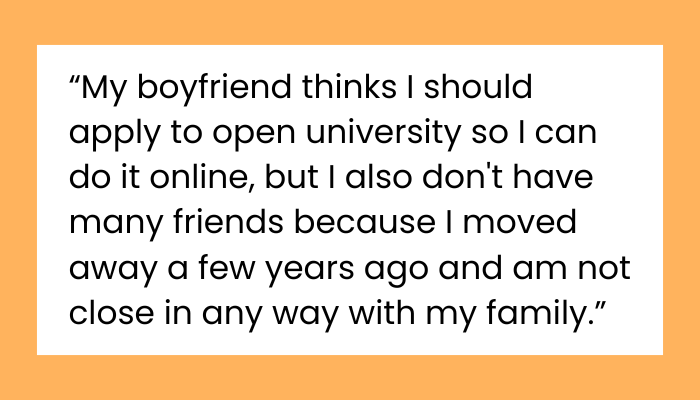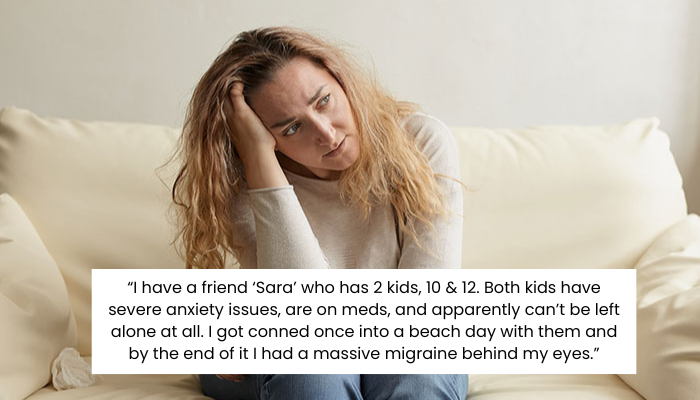Stuck between uni and my boyfriend can there be a win‑win?
You’re 20, doing a year‑long online course now, working full‑time, living with your boyfriend (30) for 4 months in a relationship of 8 months. You moved away, don’t feel close to your family, have few friends. You want to go to university to get qualifications, start a career, make friends and get direction. Your boyfriend thinks open/university study online is fine but going to a “regular” uni with in‑person classes and campus social life is risky for him: he worries you’ll cheat, meet someone younger, realise you’re in a different life stage and leave him. He says if you want to go to uni you should end the relationship. You feel hurt — you love him and want the relationship to work, but you also believe strongly in your own educational path. So you’re asking: is there an alternative solution? Something that keeps the relationship and lets you go after your goals?
From time to time we all face situations when we have to make a decision between two equally enticing options

Like this woman, who is currently has two make a decision between her career and her relationship









You’re facing a tough but common tension: your educational ambition versus your partner’s fear and life stage concerns. The good news: there are alternatives, compromises and communication strategies that might let you both win, or at least work together toward a solution. Below are layered ideas—education options, relationship dynamics, communication tools—all aimed at helping you navigate this without automatically defaulting to “break up or give up uni”.
1. Clarify what you want from uni
Start with your own motivations. You said you haven’t achieved much academically (other than GCSEs). You want qualifications, a career path, new friends and direction. That’s completely valid. Going to a physical university brings several things: structured learning environment, campus life (socialising, clubs), being around peers, routine commuting, separation of “home/work” from “study”, wider networking. Online or open‑university may lack that social part which you’ve already felt isolated in.
So: define what you must have, and what you’re flexible about. For instance:
- Must: a qualification that leads to better career opportunities.
- Should if possible: meet new people / social life.
- Flexible: distance, part‑time vs full‑time, location.
If you pick a nearby university you commute to and live at home (with your boyfriend) you might keep his concern low while gaining the physical campus experience.

2. Understand his concerns, and what’s behind them
Your boyfriend’s worry is about change — you’ll go through university, meet new people, possibly change direction, making him feel unstable. He’s older, says he’s “at the point where he wants to settle down” and they see you as in a different stage of life. These concerns, while they may feel unfair to you, come from a place of insecurity. Relationships research shows that conflict often comes not just from content (uni/no uni) but from underlying fears (of abandonment, shifting identity, losing what is known). PMC+1
If you can address his fears—by showing clarity, commitment, communication—you may reduce the friction. For example: clarifying how you’ll keep the relationship stable, what your boundaries are, how you’ll maintain contact, reassure him you’re not seeing uni as “starting a new life without him” but “growing and bringing him along”.
3. Explore workable alternative education paths
You don’t necessarily need to go full‑time, far‑away and cut yourself off to start uni. Some alternative solutions:
- Local university / commuter model: You live with him, attend nearby university part‑time or full‑time, commute. Keeps you rooted in your relationship home life, and still gives campus life and new friends.
- Part‑time study: Instead of going full‑time, consider doing the first year part‑time, fewer modules, so you balance work, relationship and study.
- Hybrid model: Some universities offer blended learning (some online, some in‑person). That gives you flexibility, social element.
- Join clubs/social groups at university intentionally: Since you feel isolated now, pick a uni that has strong social/student support. Make friends, join societies, which helps your mental wellbeing and combats isolation.
- Set a trial period: You could say: “Let’s try this academic year with uni nearby, and let’s review how our relationship is doing at set checkpoints” — giving your boyfriend some reassurance you’re not just disappearing.
4. Negotiate with your partner — create a “relationship + growth” plan
Rather than a binary “uni or break up”, you could sit down with your boyfriend and propose a structured plan. Some elements to include:
- Shared goals: “I want to get credentials so I can build a career, which will help both of us long‑term (financial stability etc.).”
- Relationship commitments: “I’ll keep our couple‑time sacred, we’ll have date nights, I’ll keep you in the loop about my uni commitments.”
- Check‑in points: Agree to revisit how things are going every 3‑6 months. If things get too stressed, you’ll adjust.
- Boundary/behaviour discussion: Talk about what “cheating” means to each of you (you said you did kiss a friend, he sees it as cheating). Clarify expectations, trust issues. If you both have clear logic and boundaries, his fear may reduce.
- Support each other: Recognise he might feel like you’re moving away; you might feel like he’s holding you back. Acknowledge both feelings. Use good conflict‑management strategies (research shows couples benefit from structured communication programmes) SpringerOpen+1
5. Accept the possibility of change — for both of you
One of the hardest things: going to uni will bring changes. You’ll meet new people, your identity might shift, your ambitions may grow. That’s not inherently a threat, but in a relationship it means both partners have to evolve. If your boyfriend wants “settling down now” but you want “growing and exploring now”, the mismatch may persist unless both adapt.
You might decide that this is a part of your life where you say: “I’m going to grow, you may come with me or you may stay, and we’ll see how it goes.” That doesn’t mean ending immediately, but it means accepting future ambiguity.
6. Evaluate your relationship health
Because it’s only been 8 months and you’ve lived together 4 months, you’re still in early relationship territory. Good signs: you love him, you’re trying. But concerns you raised: few friends, not close to family, isolating yourself. When your relationship becomes the whole world, you might lose your own growth path. Education and social networks often protect young adults from over‑dependency.
Research about relationship skills says that couples who invest in individual growth as well as joint growth tend to have healthier outcomes. SpringerOpen

7. Practical steps you can start right now
- Make a list: What universities near you allow motorway/commute, how many hours? What the cost? What part‑time options?
- Have a calm talk with your boyfriend: share your motivations for uni, listen to his fears. Don’t accuse; frame it as “I value you + I value my education”.
- Set boundaries/expectations together: e.g., nights together, check‑ins, social life.
- Make sure you plan your social life: join student societies or local clubs so you don’t rely solely on your boyfriend for social connection.
- Consider relationship counselling or resources (even free ones) to get better conflict‑resolution skills (the research points to “relationship education” programs helping couples). PMC
8. When you might need to reconsider
If after discussion your boyfriend is completely unwilling to compromise — insists you only stay home or break up — you’ll have to ask: Is this dynamic acceptable to you? If your uni dream is so important and this relationship is asking you to give it up, that is a big red flag. It doesn’t mean one of you is “wrong” but it means you may have mismatched life trajectories.
It’s okay to decide that for now your growth comes first, or that you continue this relationship while you go and see how it evolves. Life isn’t always “either/or” but sometimes “both/and” with caveats.
9. Keyword‑rich summary (for clarity)
You’re looking for “career path”, “university qualifications”, “part‑time study”, “commute to university”, “online vs campus experience”, “social life at university”, “relationship stage differences”, “communication in relationships”, “conflict resolution in couples”, “balancing study and relationship”. These are all relevant. You want to avoid sacrificing your “educational goals” for fear of changing your relationship. Research in “relationship education” shows couples who invest in their communication and conflict management tend to sustain healthier relationships when undergoing transitions. SpringerOpen
“Girl run!!!”: netizens think that the choice here is clear – she should dump him and go to the university








It’s absolutely possible to keep your relationship and go to university — but it will require clear communication, compromise from both sides, and acceptance that the relationship may shift. You’re not asking for something unreasonable: you want to build a future. He’s asking for reassurance. If both of you can meet in the middle by choosing a nearby university, committing to the relationship intentionally, managing fears and expectations, you might find a path that works.
But if his stance remains “you can’t or we break up”, you’ll need to weigh: is staying with someone who doesn’t support your educational growth worth it? You deserve someone who’s in your corner and with whom you can grow. The same goes for a partner who feels comfortable with you growing and changing. Life stage differences can be bridged, yes — but only with willingness on both sides.







